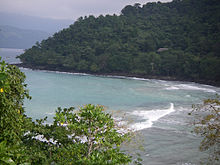Indonesia has some of the best dive sites in the world due to its location, warm waters, and various creatures under the sea. Indonesia is also located at the centre of the Coral Triangle which is home to 5,000 species of fish and hosts 20% of the world's reefs.
Understand
edit



Indonesia is the biggest archipelago nation in the world with more than 18,000 islands based on satellite count, but only somewhat more than 13,000 islands have been named and registered with the UN. It offers some of the most diverse diving experience in the world from north to south and from west to east; From very-accessible Bali, to extreme wilderness and some of the most diverse marine life in the world in the far-eastern Indonesian islands.
Dive locations
editIn early 2017, Dive magazine announced the best top ten dive sites in the world based on readers' choice, three of them, Raja Ampat, Alor, and Komodo, are in Indonesia. These three sites have strong currents, but more sheltered sites for novices are available.
- Papua: — the archipelago of Raja Ampat, in the waters of the Bird's Head Peninsula in Indonesian Papua, is regarded by Conservation International as the area with the highest marine biodiversity (e. g. 553 species of corals out of the total 798 known species) on earth. Higher than any other areas in the Coral Triangle compound which consists of Papua New Guinea, Indonesia and the Philippines. It is also insanely off-the-beaten-path which greatly helps to preserve its pristine nature, options to visit the area include staying on a liveaboard or staying in one of the few resort islands Misool, Sorido, or Arborek. In Padaido islands of Biak, you may find an undersea cave, coral garden, and World War II wrecks.
- Alor Archipelago: — very off-the-beaten-path diving in the east of Nusa Tenggara.
- Flores and Komodo National Park: — you may see manta rays.
- Bali: — Menjangan Island in the north-west, and Tulamben (USS Liberty wreck) which separates in 3 parts in different depths on the north-east coast and Amed in the east, offer pleasant and accessible shore diving through wrecks, walls and reefs. Divers visiting Bali often base themselves at Lovina, Candidasa and Amed to access the sites.
- The offshore island of Nusa Penida may offer the most dramatic diving in Bali while the neighbouring island of Nusa Lembongan is well known as a teaching centre.
- Gili Islands and Lombok: — the three Gili Islands are a major teaching centre and are known for the ease of diving conditions.
- Kalimantan: — touchable jellyfish in the lake on an atoll with not too salty water in Derawan
- Sulawesi: — intermediate to advanced diving, with occasionally strong currents.
- Wall diving at Bunaken near Manado.
- World-class diving at an all-inclusive dive resort at the insanely off-the-beaten-path Wakatobi archipelago.
- Top quality diving in the Gulf of Tomini at the Togian Islands.
- Watching whale sharks and seeing Salvador Dali coral sponge in Gorontalo.
- Pulau Weh, Sumatra: — accessed from Banda Aceh, north tip of Sumatra. Pulau Weh's reefs offer something for every level of experience. The bottom topography ranges from large boulders on sandy slopes and deep volcanic pinnacles to craggy wall sections and coral gardens. The house reef at Gapang Beach has a wide range of macro life including rare critters like Frog Fish, Star Gazers and Gurnards. Large pelagics like Mantas, Whale Sharks and Mola Mola also come to feed when the season is right. Pulau Weh offers some of the finest diving in Indonesia, yet it is still very much undeveloped. Can see also an underwater active volcano with its bubble and sulphuric smell.
- Maluku: — you may see corals also wild dolphins at Lubang Buaya Morela beach and undersea cave at Hukurila beach in Ambon. Beautiful corals in Banda Islands. Watching endemic walking shark at Falajawa beach in Ternate. Wreck diving of World War II carcass in Morotai Island.
- Java: — various dive spots with corals, fish also wreck in Karimunjawa. You may also visit a reef shark captivity there.
